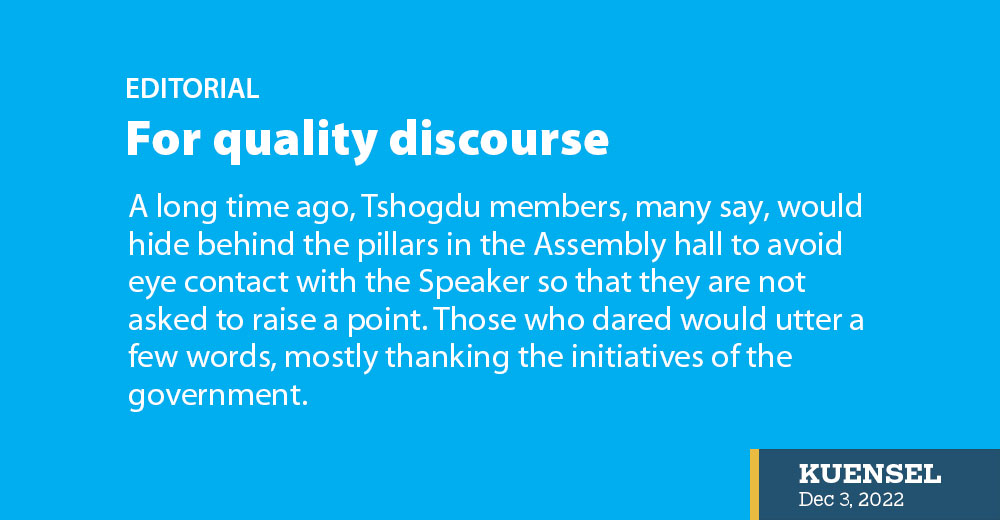A long time ago, Tshogdu members, many say, would hide behind the pillars in the Assembly hall to avoid eye contact with the Speaker so that they are not asked to raise a point. Those who dared would utter a few words, mostly thanking the initiatives of the government.
Then came the era of using the august hall as a place to showcase their oratory skills. Chimis or elected members to the unicameral Parliament would impress or put off those coming to witness the sessions. Quite often the message is lost in the flowery language, which the western educated members of the executive branch couldn’t decipher.
Many would not see or hear what transpired in the grand hall of the Assembly. There was no live broadcast or sharing clips of bloopers, the Speaker chiding or of sleeping members.
A lot has changed. The agenda is available days before the session today. What is discussed and debated is live on the national TV or live-streamed reaching a farmer ploughing his fields in Lauri or a herder in the highlands taking his yaks to graze.
What interests many, unfortunately, is the slip-ups, the skirmishes between members or the bloopers in the Assembly or the Council. A lot of decisions are made that affect each one of us. Revision of property and land taxes, civil service reforms or the many legislations that are debated affect us all. Parliamentarians are the representative of the people who elected them. The legislation they make will determine our lives.
The live sessions may be easily available or accessible, but many are not interested beyond what goes viral on social media. Most times it is not important decisions or points raised in the legislature, but of mundane things like a member forgetting his lines or the bad Dzongkha.
This week, the Chairperson of the National Council asking the Gasa MP to leave dominated talks both online and offline. Many, including the mainstream media, failed to notice an eminent member questioning the finance minister why a clean wage system was introduced overnight when countries like Singapore took decades to implement it.
Where is the debate outside the Parliament on the revised tax on property, the allowances and duty vehicles, shortage of funds to print textbooks or transfer teachers? Why are we not discussing the imbalance of trade or the exodus of young Bhutanese creating shortages of human resources in critical sectors like education and health? In short, issues of national concern. It is said that a society can be judged by the quality of societal discourse. If it is true, we are not a serious society. We are not making the most of the space to engage in serious discourse.
Public debate is the first step to understanding public issues and responsibilities. Discourse seems to be regressing as the electoral process gathers pace. As we wait to elect another government, there is no discourse on what the political parties’ ideologies are. We are busy aligning them to regions and power of influence.


